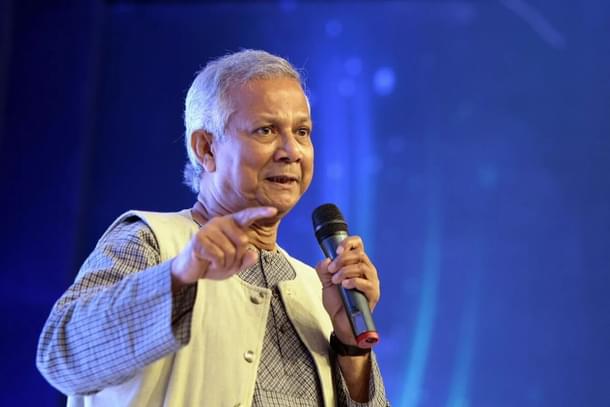News Brief
Muhammad Yunus Claims Bangladesh Is 'Guardian Of Ocean For Seven Sisters', Calls India’s Northeast Chinese ‘Extension'
Arjun Brij
Apr 01, 2025, 10:30 AM | Updated 10:29 AM IST
Save & read from anywhere!
Bookmark stories for easy access on any device or the Swarajya app.


Bangladesh's interim government adviser Muhammad Yunus has sparked controversy by making a veiled reference to India’s northeastern states while urging China to "extend" its presence in the region, NDTV reported.
His remarks, made during a four-day visit to Beijing, have been criticised as distasteful by defence analysts.
In a viral video, Yunus is seen suggesting that China establish a base in Bangladesh, indirectly challenging India's strategic position.
"The seven states of India, in the eastern part of India - called the seven sister states are completely landlocked. They have no way to reach the ocean. We (Bangladesh) are the only guardian of the ocean for the entire region (northeast India),” Yunus said.
He further remarked, "This opens up a huge possibility for China - this could become an extension of the Chinese economy. Build things, market them, take them back to China, or export to the rest of the world."
Sanjeev Sanyal, a member of Prime Minister Narendra Modi’s Economic Advisory Council, took to social media platform X to express concern over Yunus’s comments.
"Interesting that Yunus is making a public appeal to the Chinese on the basis that 7 states in India are land-locked. China is welcome to invest in Bangladesh, but what exactly is the significance of 7 Indian states being landlocked?" he questioned.
During his discussions with Chinese President Xi Jinping, Yunus secured Chinese assistance in modernising Bangladesh’s Mongla Port, a project worth $400 million.
Additionally, China pledged $350 million to expand the China Economic and Industrial Zone in Chattogram, with another $150 million allocated for technical assistance.
Yunus also sought China’s long-term support in river water management, urging Beijing to provide a 50 year assistance package. "China is the master of water management," Yunus stated, expressing Dhaka’s interest in learning from Chinese expertise.
A key point of discussion was the Teesta River, which Bangladesh jointly shares with India. While Sheikh Hasina’s government had earlier sought New Delhi’s cooperation, Yunus’s administration now appears to be shifting its reliance towards Beijing.
Furthermore, an agreement was signed for the Exchange of Hydrological Information on the Yarlung Zangbo-Jamuna River, which flows from Tibet to India before entering Bangladesh.
Yunus’s remarks and Dhaka’s growing engagement with Beijing have triggered concerns over China’s geopolitical ambitions in South Asia, especially in light of India’s long-standing ties with Bangladesh.
Arjun Brij is an Editorial Associate at Swarajya. He tweets at @arjun_brij




